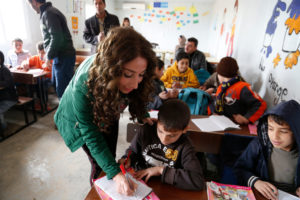Blog
International Day of Peace: The role of teachers in peacebuilding in post-conflict societies
Written by Tejendra Pherali and Laila Kadiwal (UCL Institute of Education)
September 21, 2017
The Centre for Education and International Development (CEID), UCL Institute of Education in collaboration with Centre for International Education (CIE) University of Sussex recently organised a public symposium to discuss the findings of a research study on Teachers as Agents of Peacebuilding and Social Cohesion in Post Conflict Contexts, led by Professor Yusuf Sayed.
Focusing on the cases of Rwanda and South Africa, the research explored how teachers are framed and supported in their roles as peacebuilders; how they experience this support; how their practices and attitudes are influenced by national and international educational policies, and the outcome for learners.
Very little is known about teacher recruitment, their professional development needs and their deployment in conflict-affected contexts. There is a lack of research about how teachers negotiate pedagogies, policies and delivery of the curriculum in contexts which suffer from the impact of violent conflicts. By strengthening the evidence base in these areas, this research aims to influence policy and practice in the field of education and peacebuilding.
Drawing upon the discussion, we identity some key issues that need to be recognised in relation to the role teachers can play in promoting peacebuilding and social cohesion in conflict-affected societies.
- Teachers play multiple roles in relation to conflict and peace – as victims, in some cases, perpetrators of violence and agents of peace. They can play an important role in supporting the processes of peacebuilding in post-conflict societies. To recognize their role as agents of change, they need to be involved in policy debates and their voice should be reflected in educational planning.
- A critical understanding of the myriad of pressures faced by teachers both inside and outside of the classroom would allow education community to improve educational programming, curricular framework and pedagogical approaches. Teachers need to be supported and empowered to undertake the role as peacebuilders. The top-down policy shifts that expect teachers to deal with the legacy of conflict and promote peace might produce very little unless the issues of socioeconomic inequalities, marginalisation, ethnic and racial tensions are fully recognised and taken into account in educational programming.
- Education authorities need to develop coherent policies and institutional frameworks to address teacher needs in relation to the economic, political, cultural and social dimensions of their agency.

- Teachers are a heterogeneous category as they represent a broad range of social, cultural and ideological positions. Their agency for peacebuilding is shaped at the intersection of their social class, ethnicity, religion, sexuality, gender, and their involvement in conflict as well as current institutional configurations. These elements need to be taken into account in designing teacher professional development and their inputs in reimagining educational equity and outcomes for diverse populations.
- Teacher educators are often invisible in discourses about teacher development. An urgent attention is needed in this area.
- To enhance teachers’ roles in peacebuilding and social cohesion, conflict-sensitive teacher education is key and authorities and education providers need to ensure that the curriculum is sensitive to contentious issues; promotes inclusion and contributes to broader societal goals of social justice.
- The social justice framework of 4Rs (Redistribution, Representation, Recognition and Reconciliation) can serve as tools for research in education from a peacebuilding perspective but the 4Rs should, more importantly, serve as the goals of education.
- Educational goals, at least in the formal setting, are complex products of national and international political, economic and social processes. Conflict-sensitive disruptions in those processes often face challenges from the existing systems that serve the interests of political and social elites in these contexts. However, there are possibilities for engagement across the spectrum of educational and political stakeholders who can be equal partners in facilitating reforms that benefit the communities at margins. The notions that teachers always lack in agency for change against the hegemonic control from the political elite and; policy makers as a homogenous category who exercise an absolute monopoly in policy formulation, are both unhelpful and false conceptualisations.
- Research in the area of ‘teachers and peacebuilding’ needs to go beyond the usual way of making recommendations to the government or educational practitioners. It is important that the barriers to implementation of research recommendations also need to be identified and explained so that appropriate strategies to deal with those could be developed.
- The research also needs to highlight how to enable teachers to become the bearer of the message for change. A sustainable way of engaging with teacher professional development and their continuous empowerment is necessary in order to effect change and facilitate their role in peacebuilding.
Watch the recording of the event here. One of the main research and teaching areas at CEID focuses on Education, Conflict and Peacebuilding.
Sign up to join UCL-IOE hosted Network for Research in Education, Conflict and Emergencies
Dr Tejendra Pherali (t.pherali@ucl.ac.uk) is Senior Lecturer in Education and International Development and Dr Laila Kadiwal (l.kadiwal@ucl.ac.uk) is Fellow in Education and International Development at CEID, UCL Institute of Education.
Image above of teacher and student can be found here. CC Image courtesy of DFID. on Flickr. Attribution 2.0 Generic (CC BY 2.0). Licence here.

